

US Catalog of Copyright Entries. Look up records by year The Catalog of Copyright Entries, published by the US Copyright Office, contains a list of all copyright registrations received.
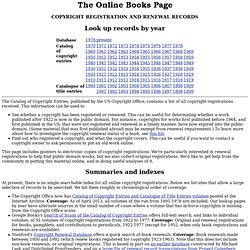
This information can be used to See whether a copyright has been registered or renewed. This can be useful for determining whether a work published after 1922 is now in the public domain. For instance, copyrights for works first published before 1964, and first published in the US, that were not registered and renewed in a timely manner, have now expired into the public domain. (Some material that was first published abroad may be exempt from renewal requirements.) Summaries and indexes. British Catalog. The aim of this site is to catalog all deceased authors, all authors of books published before 1964, and at least some more recent authors, including their full name(s), date of death, date of birth, pseudonyms, sex & nationality (for those who died from 1920 onwards), and their books published before 1964.
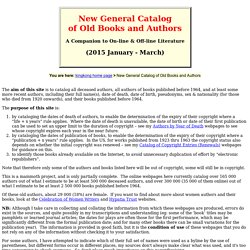
Copyright Renewal Database: Simple search. Kindle Direct Publishing: Help. Selling content that is in the public domain is permissible through our program.
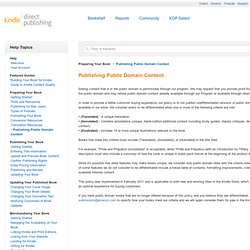
We may request that you provide proof that your submitted material is actually in the public domain and may refuse public domain content already available through our Program or available through other retail sites. In order to provide a better customer buying experience, our policy is to not publish undifferentiated versions of public domain titles where a free version is available in our store. We consider works to be differentiated when one or more of the following criteria are met: • (Translated) - A unique translation • (Annotated) - Contains annotations (unique, hand-crafted additional content including study guides, literary critiques, detailed biographies, or detailed historical context) • (Illustrated) - Includes 10 or more unique illustrations relevant to the book.
Copyright Term Extension Act. Expansion of U.S. copyright law (assuming authors create their works 35 years prior to their death) The Copyright Term Extension Act (CTEA) of 1998 extended copyright terms in the United States.
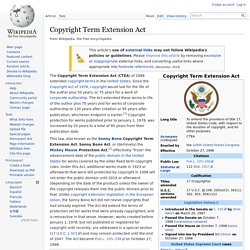
Since the Copyright Act of 1976, copyright would last for the life of the author plus 50 years, or 75 years for a work of corporate authorship. The Act extended these terms to life of the author plus 70 years and for works of corporate authorship to 120 years after creation or 95 years after publication, whichever endpoint is earlier.[1] Copyright protection for works published prior to January 1, 1978, was increased by 20 years to a total of 95 years from their publication date. UK Copyright Service. Intellectual property (or IP) refers to creative work which can be treated as an asset or physical property.
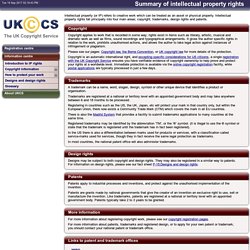
Intellectual property rights fall principally into four main areas; copyright, trademarks, design rights and patents. Copyright Copyright applies to work that is recorded in some way; rights exist in items such as literary, artistic, musical and dramatic work as well as films, sound recordings and typographical arrangements. Search Copyright Records. Notices of Restored Copyrights In 1996, copyright was automatically restored in certain foreign works that were then in the public domain in the United States but were protected by copyright or neighboring rights in the source country.

Read More Online Service Providers. (Book) Library Digitization Projects and Copyright. Editors' Note (SP): This article is divided into six parts.
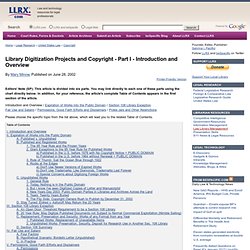
You may link directly to each one of these parts using the chart directly below. In addition, for your reference, the article's complete Table of Contents appears in the first section of the article. Introduction and Overview / Expiration of Works into the Public Domain / Section 108 Library Exception Fair Use and Salami / Permissions, Good Faith Efforts and Disclaimers / Pickle Jars and Other Restrictions Please choose the specific topic from the list above, which will lead you to the related Table of Contents. I. I went to the corner magazine stand, bought a new Forbes magazine, read it, then ripped it to pieces. But what if the articles were really, really old? But no, this article is my reply: If the item is not in the public domain, not all is lost. If Section 108's conditions and limitations do not suit your need, you can move down the flow chart to the GRAY. Footnotes: FAQ: How Can I Tell Whether a Book Can Go Online? How Can I Tell Whether a Book Can Go Online?
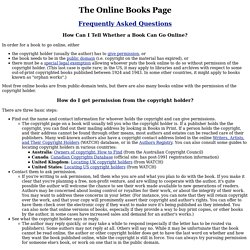
In order for a book to go online, either the copyright holder (usually the author) has to give permission, or the book needs to be in the public domain (i.e. copyright on the material has expired), or there must be a special legal exemption allowing whoever puts the book online to do so without permission of the copyright holder. (This last case is quite rare; in the US, it may apply to libraries and archives with respect to some out-of-print copyrighted books published between 1924 and 1943. In some other countries, it might apply to books known as "orphan works".) WATCH File.